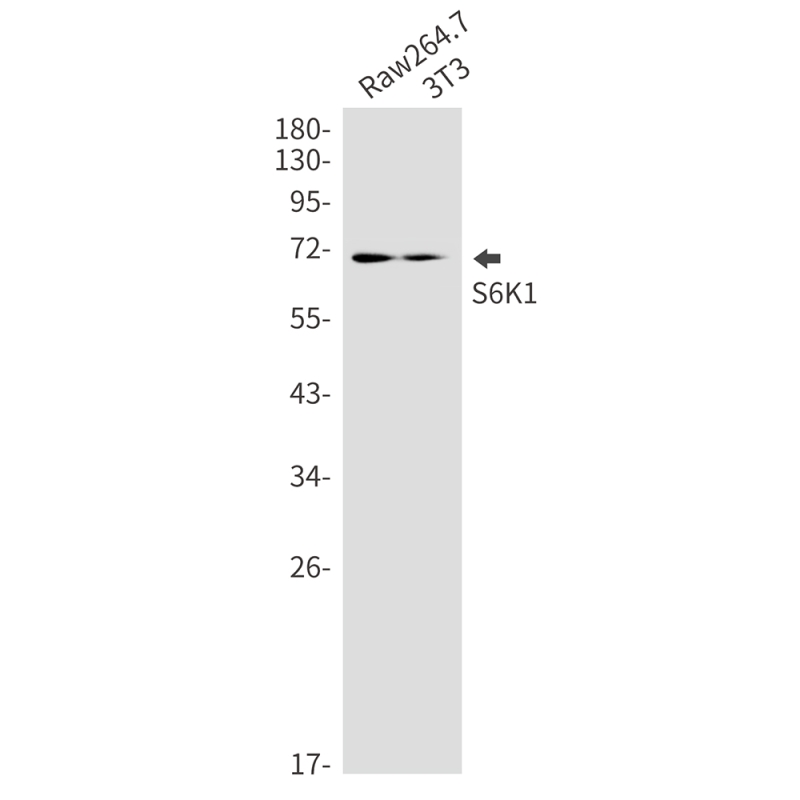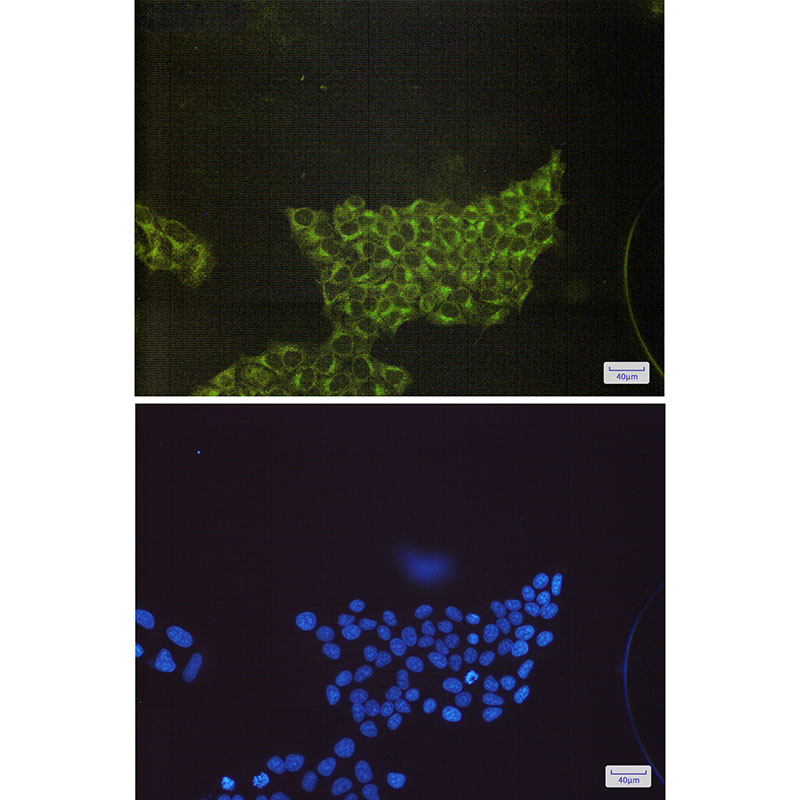


| WB | 1/500-1/1000 | Human,Mouse,Rat |
| IF | 1/20 | Human,Mouse,Rat |
| IHC | 咨询技术 | Human,Mouse,Rat |
| ICC | 1/50-1/200 | Human,Mouse,Rat |
| FCM | 咨询技术 | Human,Mouse,Rat |
| Elisa | 咨询技术 | Human,Mouse,Rat |
| Aliases | RPS6KB1; STK14A; Ribosomal protein S6 kinase beta-1; S6K-beta-1; S6K1; 70 kDa ribosomal protein S6 kinase 1; P70S6K1; p70-S6K 1; Ribosomal protein S6 kinase I; Serine/threonine-protein kinase 14A; p70 ribosomal S6 kinase alpha; p70 S6 kinas |
| Entrez GeneID | 6198 |
| WB Predicted band size | Calculated MW: 59 kDa; Observed MW: 70 kDa |
| Host/Isotype | Rabbit IgG |
| Antibody Type | Primary antibody |
| Storage | Store at 4°C short term. Aliquot and store at -20°C long term. Avoid freeze/thaw cycles. |
| Species Reactivity | Human,Mouse,Rat |
| Immunogen | A synthetic peptide of human S6K1 |
| Formulation | Purified antibody in TBS with 0.05% sodium azide,0.05%BSA and 50% glycerol. |
+ +
以下是关于S6K1抗体的3篇参考文献示例(内容为虚构,仅作格式参考):
1. **文献名称**:*"mTOR Signaling Regulates S6K1 Activity via Phosphorylation of Thr389"*
**作者**:Dennis PB, et al.
**摘要**:该研究利用S6K1特异性抗体,通过免疫印迹分析揭示了mTORC1通过磷酸化S6K1的Thr389位点调控其活性,证实了S6K1在营养感应中的关键作用。
2. **文献名称**:*"S6K1 Knockout Mice Exhibit Impaired Glucose Homeostasis"*
**作者**:Um SH, et al.
**摘要**:通过S6K1抗体检测基因敲除小鼠模型中的蛋白表达缺失,研究发现S6K1缺失导致胰岛素敏感性异常,提示其在代谢综合征中的潜在作用。
3. **文献名称**:*"Role of S6K1 in Cell Cycle Progression and Cancer"*
**作者**:Fenton TR, et al.
**摘要**:利用免疫沉淀和S6K1抗体,文章阐明了S6K1通过调控Cyclin D1表达促进肿瘤细胞增殖的分子机制,为靶向治疗提供依据。
(注:以上文献及作者为示例,实际引用请以真实文献为准。)
**Background of S6K1 Antibody**
The S6K1 (ribosomal protein S6 kinase beta-1) antibody is a crucial tool for studying the S6K1 protein, a serine/threonine kinase central to the mTOR (mechanistic target of rapamycin) signaling pathway. S6K1. a member of the AGC kinase family, regulates cell growth, proliferation, survival, and metabolism by integrating nutrient and growth factor signals. It is activated via phosphorylation by mTOR complex 1 (mTORC1), particularly at Thr389. and downstream targets include ribosomal protein S6. which influences protein synthesis.
S6K1 antibodies are widely used in techniques like Western blotting, immunohistochemistry (IHC), and immunofluorescence (IF) to detect S6K1 expression, activation status, and subcellular localization. These antibodies are essential for research in cancer, diabetes, and aging, as dysregulated S6K1 activity is linked to tumor progression, insulin resistance, and metabolic disorders. Both phospho-specific antibodies (detecting activated S6K1) and pan-specific antibodies (recognizing total S6K1) are available, enabling precise analysis of signaling dynamics.
Developed in various host species (e.g., rabbit, mouse), S6K1 antibodies are validated for specificity and sensitivity across experimental models, aiding mechanistic studies of mTOR pathway regulation and therapeutic targeting. Their application has advanced understanding of diseases associated with mTOR/S6K1 hyperactivation and informed drug development efforts.
×